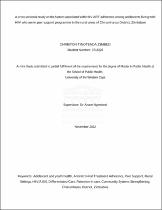| dc.contributor.advisor | Nyembezi, Anam | |
| dc.contributor.author | Zimbizi, Christon Tinotenda | |
| dc.date.accessioned | 2023-03-03T07:35:15Z | |
| dc.date.issued | 2022 | |
| dc.identifier.uri | http://hdl.handle.net/11394/9680 | |
| dc.description | Magister Public Health - MPH | en_US |
| dc.description.abstract | Adherence to treatment is important for ensuring positive health effects for people
living with HIV. This is even more so important for adolescents and young people who are in their
formative years and should be in optimum health condition to get the best quality of life. However,
HIV ART adherence for young people is generally lower than for other populations groups in Sub-
Saharan Africa. If the young people are based in a rural area, the dynamics become harder for HIV
adherence to treatment due to challenges of infrastructure, distance and living conditions. An
understanding of the facilitators and barriers to treatment for young people who have been exposed
to a peer support programme could help in ensuring that the young people adhere to treatment. The
aim of the study was to determine factors associated with HIV ART among adolescents living with
HIV who are in a peer support programme in the rural areas of Chirumhanzu District, in
Zimbabwe. | en_US |
| dc.language.iso | en | en_US |
| dc.publisher | University of the Western Cape | en_US |
| dc.subject | Adolescent | en_US |
| dc.subject | HIV | en_US |
| dc.subject | Public health | en_US |
| dc.subject | Chirumhanzu District | en_US |
| dc.subject | Maternal health | en_US |
| dc.title | A cross sectional study on the factors associated with HIV art adherence among adolescents living with HIV who are in peer support programme in the rural areas of Chirumhanzu district, Zimbabwe | en_US |
| dc.rights.holder | University of the Western Cape | en_US |
| dc.description.embargo | 2024 | |

